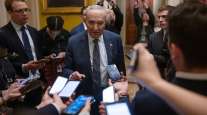Oil Falls as Focus Returns to OPEC After Trump Election Surprise

Futures declined as much as 1.9% in New York, erasing earlier gains after the International Energy Agency said prices may retreat amid “relentless global supply growth” unless the Organization of Petroleum Exporting Countries enacts significant output cuts. The dollar rose to an eight-month high against its peers amid increased inflation expectations, putting downward pressure on commodities priced in the currency.
Traders are weighing the implications of a Republican again presiding over the nation that consumes more oil than any other — and is one of the biggest producers, too. Trump has promised freedom from OPEC, and some of his energy policies include opening federal lands to drilling and freeing up offshore areas to development. While investors took comfort from a conciliatory acceptance speech Nov. 9, surging U.S. crude supplies served as a reminder of the massive global glut, which IEA said could persist through 2017.
"The IEA report showed that OPEC production has climbed to a new high, which is cause for concern," said Michael Lynch, president of Strategic Energy & Economic Research in Winchester, Massachusetts. "When we thought they were about to put their foot on the break, they were actually putting their foot on the accelerator."
West Texas Intermediate for December delivery fell 63 cents, or 1.4%, to $44.64 a barrel at 11:37 a.m. on the New York Mercantile Exchange. Prices closed up 0.6% on Nov. 9, erasing an earlier 4.3% slide as Trump’s pledge to unite divided political factions prompted a reversal in the knee-jerk sell-off. Aggregate trading volume on Nymex showed 1.768 million contracts changing hands, according to updated data Nov. 10.
Brent for January settlement slipped 58 cents, or 1.3%, to $45.78 a barrel on the London-based ICE Futures Europe exchange, trading at a 45-cent premium to January WTI. The global benchmark crude rose 0.7% to $46.36 on Nov. 9.
"The Trump election is extremely bullish for energy and infrastructure companies," said Jay Hatfield, the New York-based portfolio manager of the InfraCap MLP ETF with $125 million in assets. “It’s not irrational to expect the companies to be higher, while the commodity itself is lower, at least in the short term."
The next test for the oil market is whether OPEC can finalize an agreement to curb production at an official meeting Nov. 30. Iranian Oil Minister Bijan Namdar Zanganeh is optimistic an accord will be reached when members meet in Vienna, the Oil Ministry’s news agency Shana reported.
It’s still too early to tell what impact a Trump presidency could have on the nuclear deal that enabled a resurgence in Iranian production, said Claudio Descalzi. CEO of Eni SpA.




